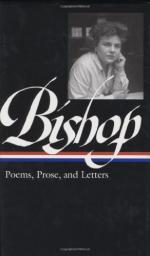|
This section contains 7,609 words (approx. 26 pages at 300 words per page) |

|
SOURCE: Brogan, Kathleen. “Lyric Voice and Sexual Difference in Elizabeth Bishop.” In Writing the Woman Artist: Essays on Poetics, Politics, and Portraiture, edited by Suzanne W. Jones, pp. 60-78. Philadelphia: University of Pennsylvania Press, 1991.
In the following essay, Brogan explores Adrienne Rich's contention that Bishop's lyric voice “explores issues of outsiderhood and difference.”
In her 1983 review of Elizabeth Bishop's posthumously published Complete Poems, Adrienne Rich calls for new readings of Bishop, sensitive to her understanding of “outsiderhood” and “difference.”1 Rich acknowledges that her view of Bishop as an outsider who “was critically and consciously trying to explore marginality, power and powerlessness” (BBP 135) came late, after years of difficulty with Bishop's poetry. As a young poet “looking for a female genealogy,” she failed to find in Bishop's polished, reserved work a model for the boldly personal, politically engaged feminine aesthetics Rich herself would later define. Rich ascribes her earlier...
|
This section contains 7,609 words (approx. 26 pages at 300 words per page) |

|


